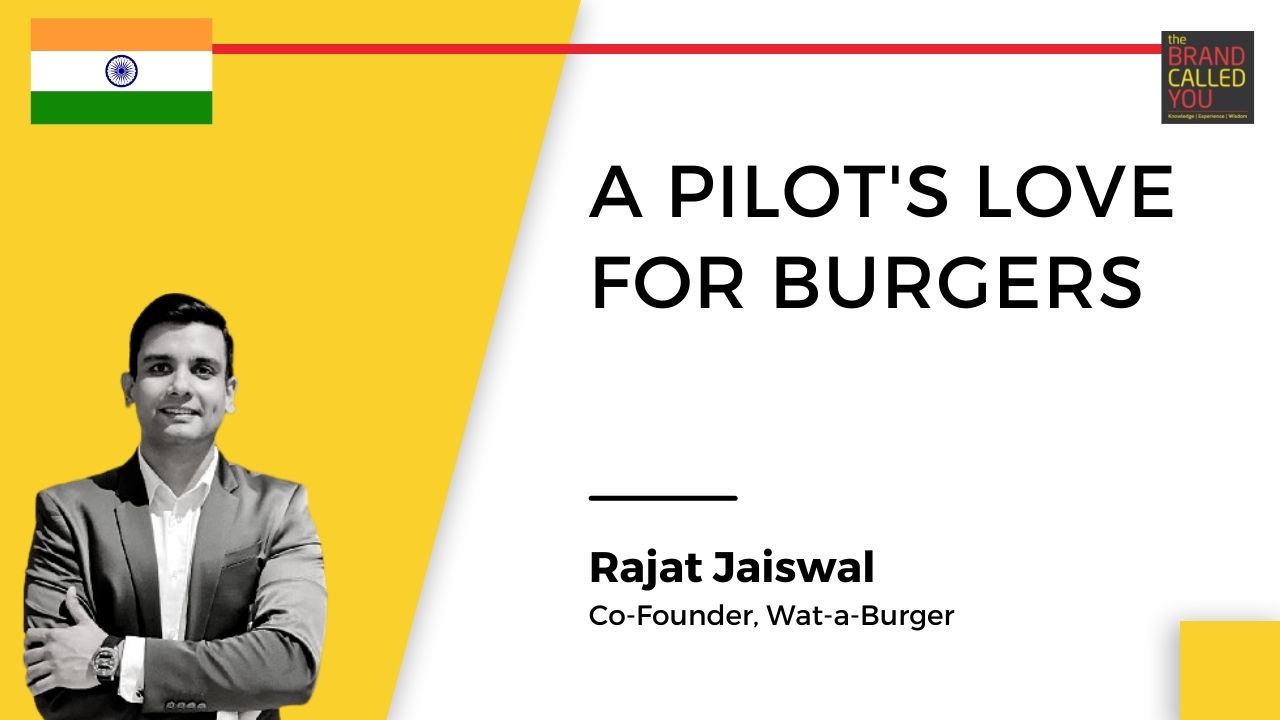Rajat Jaiswal, Co-Founder, Wat-a-Burger
Captain Rajat Jaiswal is the cofounder of Wat-a-Burger, an Indian burger chain. We know you would be wondering, why are we introducing him as a captain. Our guest for the day is also a senior commander in a leading airline in India.
Podcast
Overview
Who doesn’t want to grab a quick burger after a hectic day? No time to wait for an elaborate meal? Well, you always have a burger. But missing Indian flavor food? Miss no more, as you have the Indian flavors fused in a quick burger meal with Wat-a-Burger, a made-in-India burger chain.
About Rajat Jaiswal
Captain Rajat Jaiswal is the cofounder of Wat-a-Burger, an Indian burger chain. We know you would be wondering, why are we introducing him as a captain. Our guest for the day is also a senior commander in a leading airline in India. Today, we discuss how he is soaring high in his entrepreneurial journey.
DISCUSSION
Captain Jaiswal started a burger business as he saw a considerable gap in the fast-food segment in India. His business chain, “Wat-a-Burger”, is an easy-to-make, spread, establish, and replicable model. Captain Jaiswal acknowledges the perks that come with the airline business, however, always had a dream of starting something on his own.
Challenges
Captain Jaiswal lists down two primary challenges he faced while scaling up:
- Making recognition: A key thing in the franchising business
- Time Management: He had off working hours which was a challenge to complete the tasks for his business, which are usually day events
He further talks about other secondary challenges that one faces in almost every business.
Defining a Good Burger
Captain Jaiswal tailors the burgers purely on statistics. The two USPs that Wat-a-Burger has are:
- Fusion of Indian flavours
- Low Price
They also stand apart as they make the buns themselves. He further talks about the reasons for increasing the burger business in India. Burgers are economical and are easy to grab. The business model is easy to replicate, as one doesn’t need to hire exceptional cooks for making a burger.
Experimentation with Food
Captain Jaiswal agrees with the increasing experimental choice of Indians.
He says, “We did our first joint in 2016, we were different because we did fusion food which was an experiment. It became successful because people wanted to try something different. With several startups in the food industry, people are exposed to so many choices, that they get used to it. Now, even global joints have started fusing Indian flavours in the burgers two years back, which we have been doing for seven years.”
He elaborates on the meals served at Wat-a-Burger. They have options ranging from an aloo achari burger to the classic butter chicken burger, with a number of varieties of fries and shakes.
Vulnerabilities of Global Brands
Captain Jaiswal feels that made-in-India burger brands have an upper hand even over the long-established global giants. He says, “They have scaled to a point where they don’t work on the aspects that work with Indians. They pick up a model made for a country that is not India. They pick up the models with a few twists and send them to India.”
He compares the different approaches that they have towards saving costs with real estate and manpower.
More About Burger Business in India
Constant menu changes and brand refreshments are important as people are exposed to a large variety of choices. They hesitate to go for the same thing always. Captain Jaiswal considers it to be a major challenge, especially in tier 1 cities. He says, “Brand loyalty is going away too fast, especially in places with too much variety.”
He talks about the practices they adopt at their end for constant refreshments for the customers.
Profile
Rajat started Wat-a-Burger with his childhood friend Farman Beig with Rs 25 lakh in 2015. The duo registered their company in the name of Super Fry India Pvt Ltd and started the first outlet in Noida with just six employees.
The first year’s turnover was Rs 75 lakh (2015-16), which was achieved in just seven months of operation. The company continued to grow each year both in terms of turnover and also in a number of outlets.
They offered franchises and the outlets soon spread to other cities. “We set up the business for the franchisee, from setting up the place to providing them all the necessary equipment and then supplying the raw materials to maintain the quality,” says Rajat.


